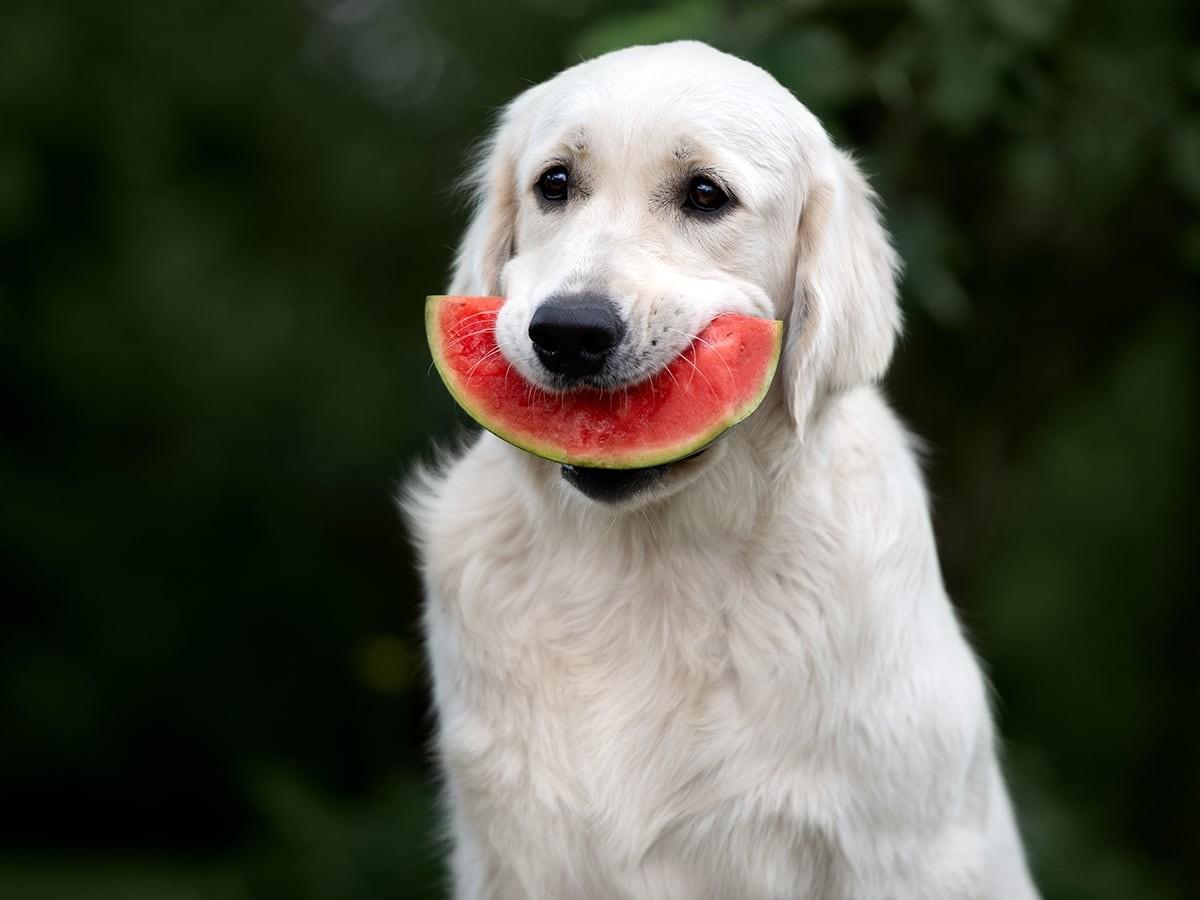Watermelon is a popular summer fruit enjoyed by many, and you might be wondering if it's safe to share with your furry friend. The good news is that dogs can indeed eat watermelon, but there are a few crucial precautions to take to ensure their safety and enjoyment.
Is Watermelon Good for Dogs?
Watermelon is a healthy and hydrating treat for dogs, packed with nutrients like potassium and vitamins A, B6, and C. It's also a great source of fiber, which aids in digestion. Since it's 92% water, watermelon is a low-calorie snack that can help keep your dog cool and hydrated, especially during hot weather.1 It's a much healthier alternative to sugary treats like ice cream, which can cause stomach upset in dogs.
How to Feed Your Dog Watermelon
While the pink flesh of watermelon is safe and nutritious for dogs, the seeds and rind should be avoided. Watermelon seeds can pose a choking hazard or, if swallowed in large quantities, cause an intestinal blockage, which may require surgery to correct. The rind, on the other hand, is difficult to digest and can lead to gastrointestinal upset, resulting in vomiting or diarrhea.
To safely feed watermelon to your dog, follow these steps:
Remove the seeds: Carefully remove all seeds from the watermelon before offering it to your dog. Seedless varieties are a convenient option.
Cut into bite-sized pieces: Chop the watermelon flesh into small, manageable pieces that your dog can easily chew and swallow.
Feed in moderation: Treats, including watermelon, should not exceed 10% of your dog's daily calorie intake.3 Start with a small amount and monitor your dog for any signs of digestive upset.
What Should I Know Before Giving My Dog Watermelon?
While watermelon is generally safe for dogs, it's important to consult your veterinarian before introducing any new food into your dog's diet, especially if your dog has any underlying health conditions. If your dog shows any signs of an allergic reaction, such as itching, swelling, or difficulty breathing, discontinue feeding watermelon and seek veterinary care immediately.
Can Dogs Eat Watermelon Rind?
Feeding your dog watermelon rind is not recommended, as its tough, fibrous texture can cause choking, digestive upset, or even intestinal blockage.
Frequently Asked Questions
How much watermelon can I give my dog? Dogs can safely enjoy a few bite-sized pieces of seedless watermelon – roughly 2-3 small chunks for most dogs – but it should be kept to an occasional treat and not more than about 10% of their daily calories.
Why can’t dogs have watermelon? While watermelon flesh is safe, the rind and seeds are problematic because the rind is hard to digest and seeds can pose a choking hazard or cause intestinal blockage.
Are any fruits toxic to dogs? Yes — certain fruits such as grapes, raisins, avocados, cherries (especially pits and stems), and citrus fruits can be toxic or cause serious health issues in dogs.
Do dogs fully digest watermelon? Dogs can digest the soft flesh of watermelon, which is mostly water and easy on the stomach, but the rind and seeds may not be fully broken down and could lead to digestive upset or blockage.
More About Spot Pet Insurance
Pet insurance can help provide financial assistance for covered veterinary care in case of unexpected accidents, illnesses, or injuries. Our plans can help pet parents manage the eligible costs of covered veterinary care and help ensure that their pets can receive the best treatment possible. Here are some ways that Spot pet insurance plans can help:
Covers Unexpected Veterinary Costs: Spot pet insurance plans help cover the eligible costs of unexpected veterinary treatments, such as emergency surgeries, X-rays, and prescription medications for covered conditions.
Customizable Plans: Choose your annual limit, reimbursement rate, and deductible from a range of options, and create the plan that will fit the needs of your pet and your budget.
Peace of Mind: With Spot pet insurance plans, pet parents can know that they can provide the best care for their pet with less worry about the cost.
To learn more about Spot Plans or to get a free quote, click here.
Key Takeaway
Watermelon can be a refreshing and nutritious treat for your dog when fed responsibly. By following the simple precautions outlined above, you can ensure that your furry friend enjoys this juicy fruit safely and without any adverse effects. So next time you're enjoying a slice of watermelon, feel free to share a few bites with your canine companion – it's a sweet way to show them some love while keeping them cool and hydrated.
–By Dr. Barry Goldbery, Founder of Hemp Pet Collar

Dr. Goldberg (DVM) has owned and operated 12 animal hospitals throughout his career and served as Senior Director of Innovation, designing medical products to be utilized in animal hospitals. Today, he provides dental services to 75 pet stores and salons.
“Can Dogs Eat Watermelon?” Hills Pet Nutrition, Inc., Hills Pet Nutrition, Inc., 9 Aug. 2021, www.hillspet.com/dog-care/nutrition-feeding/can-dogs-eat-watermelon.
“Can Dogs Eat Watermelon? Read before You Feed.” Purina, Purina, www.purina.co.uk/articles/dogs/feeding/what-dogs-eat/can-dogs-eat-watermelon.
Burke, Anna. “How Many Treats to Give a Dog a Day.” American Kennel Club, American Kennel Club, 7 Feb. 2023, www.akc.org/expert-advice/nutrition/how-many-treats-can-dog-have/.












